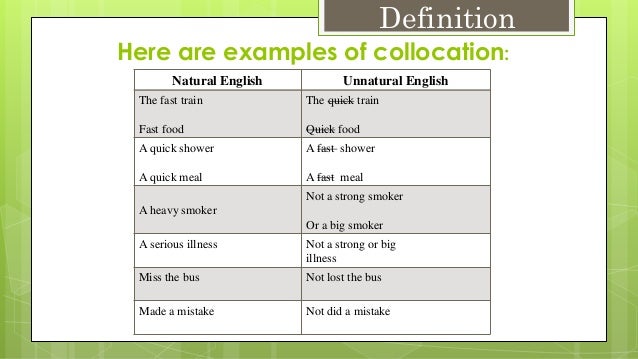COLLOCATION
A collocation is a group of words that usually go together. For example, in English, we usually say 'heavy rain'. It's correct grammatically to say 'strong rain' or 'big rain', but both of these sound completely strange. A native English speaker would never say 'big rain'. If you use the normal collocation ('heavy rain') your English will sound a lot better and more natural and it will be easier for native speakers to understand you. Collocations are very, very important.
It's very difficult to give a list of collocations, because there are so many. In fact, almost every word in English has other words that it usually goes with.
There are several different types of collocation. Collocations can be adjective + adverb, noun + noun, verb + noun and so on. Below you can see seven main types of collocation in sample sentences.
EXAMPLE
- Adverb + Adjective : completely satisfied (not downright satisfied)
- Adjective + Noun : excruciating pain (not excruciating joy)
- Noun + Noun : a surge of anger (not a rush of anger)
- Noun + Verb : lions roar (not lions shout)
- Verb + Noun : commit suicide (not undertake suicide)
- Verb + Expression with Preposition : burst into tears (not blow up I tears)
- Verb + Adverb : wave frantically (not wave feverishly)
1. adverb + adjective
- Invading that country was an utterly stupid thing to do.
- We entered a richly decorated room.
- Are you fully aware of the implications of your action?
- The doctor ordered him to take regular exercise.
- The Titanic sank on its maiden voyage.
- He was writhing on the ground in excruciating pain.
- Let's give Mr Jones a round of applause.
- The ceasefire agreement came into effect at 11am.
- I'd like to buy two bars of soap please.
- The lion started to roar when it heard the dog barking.
- Snow was falling as our plane took off.
- The bomb went off when he started the car engine.
- The prisoner was hanged for committing murder.
- I always try to do my homework in the morning, after making my bed.
- He has been asked to give a presentation about his work.
- We had to return home because we had run out of money.
- At first her eyes filled with horror, and then she burst into tears.
- Their behaviour was enough to drive anybody to crime.
- She placed her keys gently on the table and sat down.
- Mary whispered softly in John's ear.
- I vaguely remember that it was growing dark when we left.
example
Strong tea (not Powerful tea/coffee)
Tall Tree (not High Tree)https://www.englishclub.com/vocabulary/collocations-samples.htm








The most interesting text on this interesting topic that can be found on the net ... help with paper
BalasHapus